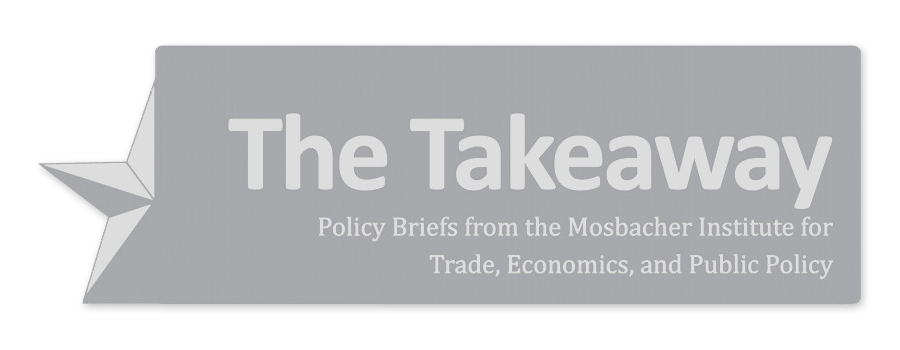
The Takeaway offers its readers concrete ideas to take away and integrate into their thinking about a policy problem or current event. It features concise, well-reasoned analysis, thoughtful policy discussion, and practical recommendations on the key issues facing decision-makers.
The Mosbacher Institute is interested in your comments about our publications
Volume 17 (2026)

February 2026: Values Have Value – A Policy Framework for Embedding Ethical Practices in Business
by Anupam Agrawal
Anupam Agrawal examines how ethical practices, when embedded as core business policies, foster trust, sustainability, and long-term performance. Drawing from economics literature and case studies of global firms, the Takeaway demonstrates that strategies emphasizing integrity, transparency, and respectful relations with customers and suppliers are not merely abstract ideals but replicable drivers of success. Agrawal’s analysis links ethical leadership and organizational policy to productivity, employee outcomes, and lasting reputational strength. The findings show that a practical, policy-driven approach to ethics can secure enduring competitive advantage and business growth.
Read The Takeaway Values Have Value – A Policy Framework for Embedding Ethical Practices in Business
Volume 16 (2025)

November 2025: Understanding Stablecoins: Market Growth, Regulatory Changes, and the Genius Act
by Christopher K. Odinet
In this new issue of The Takeaway, Christopher Odinet examines the rapid growth of stablecoins and the legal gap surrounding their use as payment instruments. He argues that while stablecoins promise faster and more inclusive transactions, their expansion has outpaced existing regulations exposing consumers to risks of insolvency and loss of redemption rights. The paper highlights the GENIUS Act as the first U.S. law to formally define and regulate “payment stablecoins,” offering new protections for holders while raising implementation challenges, particularly in decentralized systems. Blending financial, legal and policy analysis, this paper presents stablecoins as both a great financial innovation and a test of how modern law adapts to digital money.
Read The Takeaway Understanding Stablecoins: Market Growth, Regulatory Changes, and the Genius Act
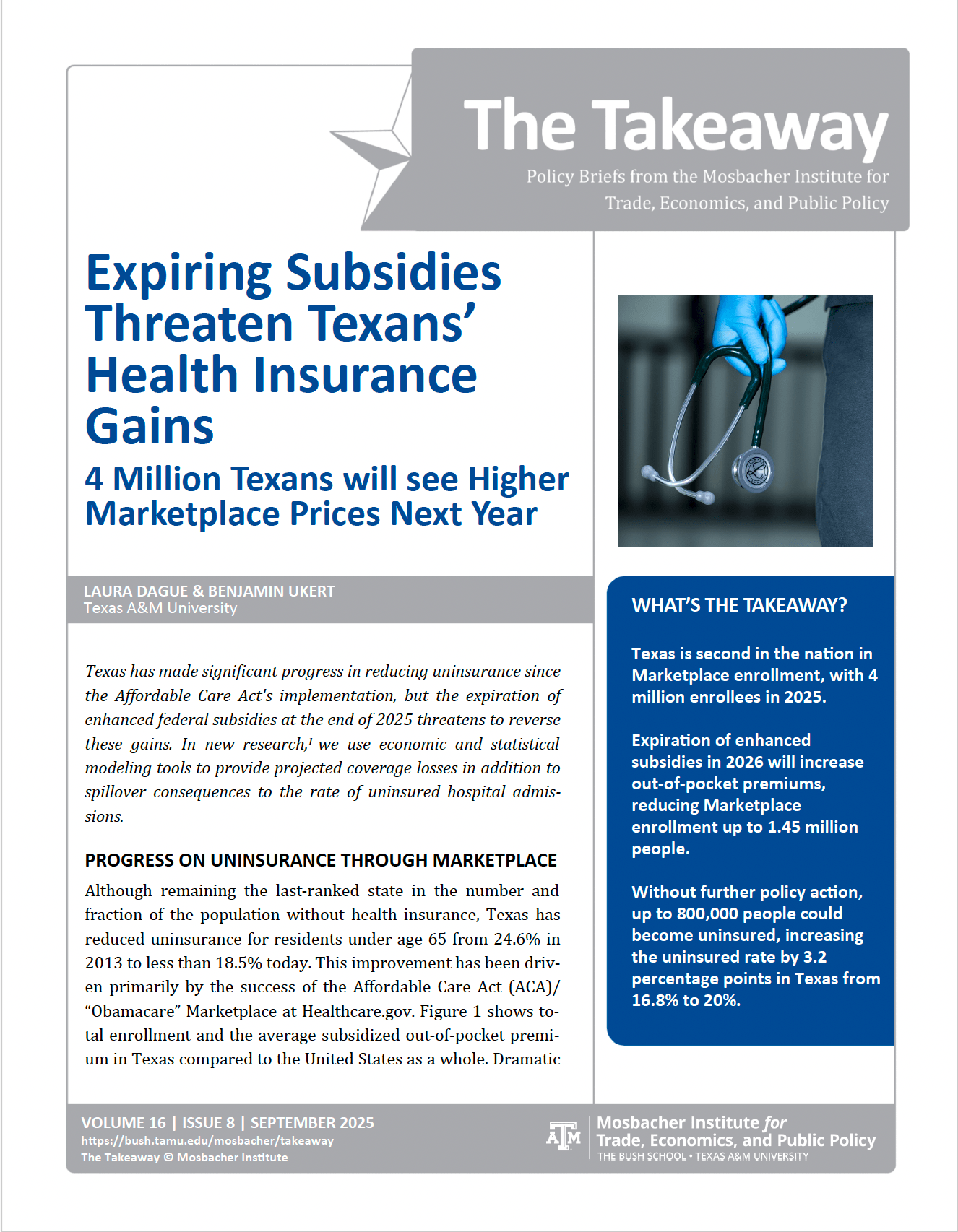
September 2025: Expiring Subsidies Threaten Texans’ Health Insurance Gains
by Laura Daugue and Benjamin Ukert
Federal subsidies offered through the Affordable Care Act’s health insurance marketplace are set to be terminated at the end of 2025, taking effect at the start of the 2026 plan year. These subsidies were known for promoting reduced uninsurance across the United States and especially in Texas, decreasing from 25.6% in 2013 to 18.5% in 2025. With the expiration of the subsidies, this Takeaway discusses the effects this might have on health insurance Marketplace enrollment in Texas. The authors argue that enrollment could be reduced by up to 1.45 million and almost 800,000 people could become uninsured in the next years. Ultimately, Dague and Ukert recommend controlling the underlying growth of healthcare prices to enhance resistance to such shocks, due to the temporary effects of subsidies.
Read The Takeaway Expiring Subsidies Threaten Texans’ Health Insurance Gains
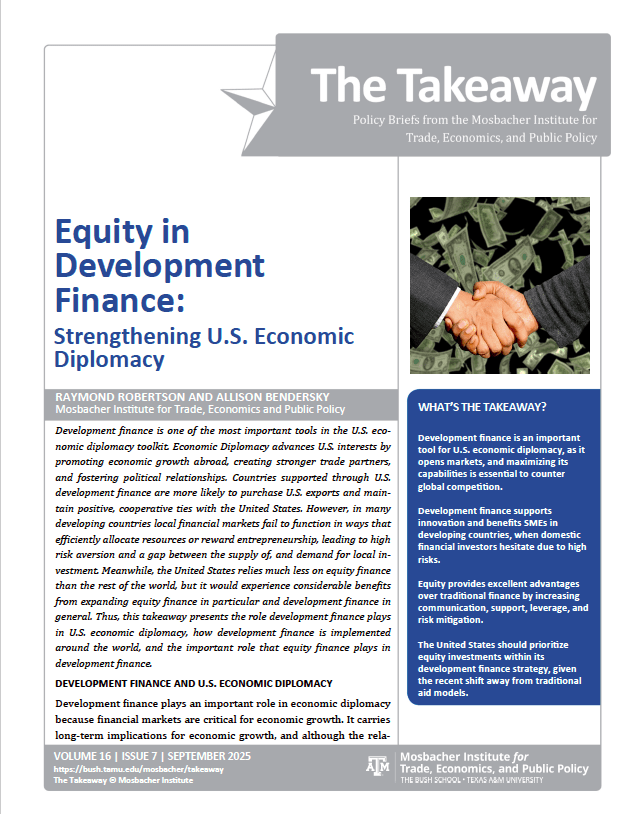
September 2025: Equity in Development Finance: Strengthening U.S. Economic Diplomacy
by Raymond Robertson and Allison Bendersky
Development finance has historically shaped relations between developed and developing countries prompting debates of efficiency and usefulness. Nonetheless, traditional aid models have always been predominant in these processes and debates, with insufficient attention given to the role of equity. This issue of The Takeaway brings equity to the table, debating its importance and impact in developing countries and the ability it has in countering global competition for the United States. The authors argue that development finance boosts domestic economies by supporting small and medium-sized enterprises, which in turn enhances economic and diplomatic ties, while equity mitigates risk. They recommend that the United States prioritize equity in its development finance strategy, given the recent shift away from traditional aid models.
Read The Takeaway Equity in Development Finance: Strengthening U.S. Economic Diplomacy

August 2025: Migration, Health, and Security: Emergency Care Provision at the U.S.-Mexico Border
By Christine Crudo Blackburn
The increasing humanitarian crisis in the U.S.- Mexico border has drawn international attention to the health conditions of migrants crossing the border. However, little has been said about the challenges faced by the Emergency Medical Services (EMS) and their clinicians. This policy brief highlights the reality of the EMS system in border communities, discussing the financial strain and high expectations placed on their services amid an increasing number of humanitarian needs. The study also examines the mental, financial and political implications of this crisis, spanning from clinicians’ burnout to reduced retention, arguing for acknowledgement of the unique needs of border emergency care services in order to better support both clinicians and patients.
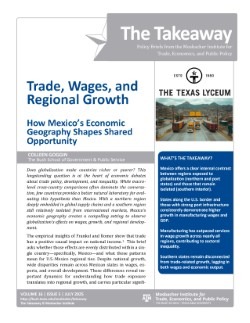
July 2025: Trade, Wages, and Regional Growth: How Mexico’s Economic Geography Shapes Shared Opportunity
By Colleen Goggin
Does globalization make countries richer or poorer? This longstanding question is at the heart of economic debates about trade policy, development, and inequality. While macro-level cross-country comparisons often dominate the conversation, few countries provide a better natural laboratory for evaluating this hypothesis than Mexico. With a northern region deeply embedded in global supply chains and a southern region still relatively isolated from international markets, Mexico’s economic geography creates a compelling setting to observe globalization’s effects on wages, growth, and regional development.
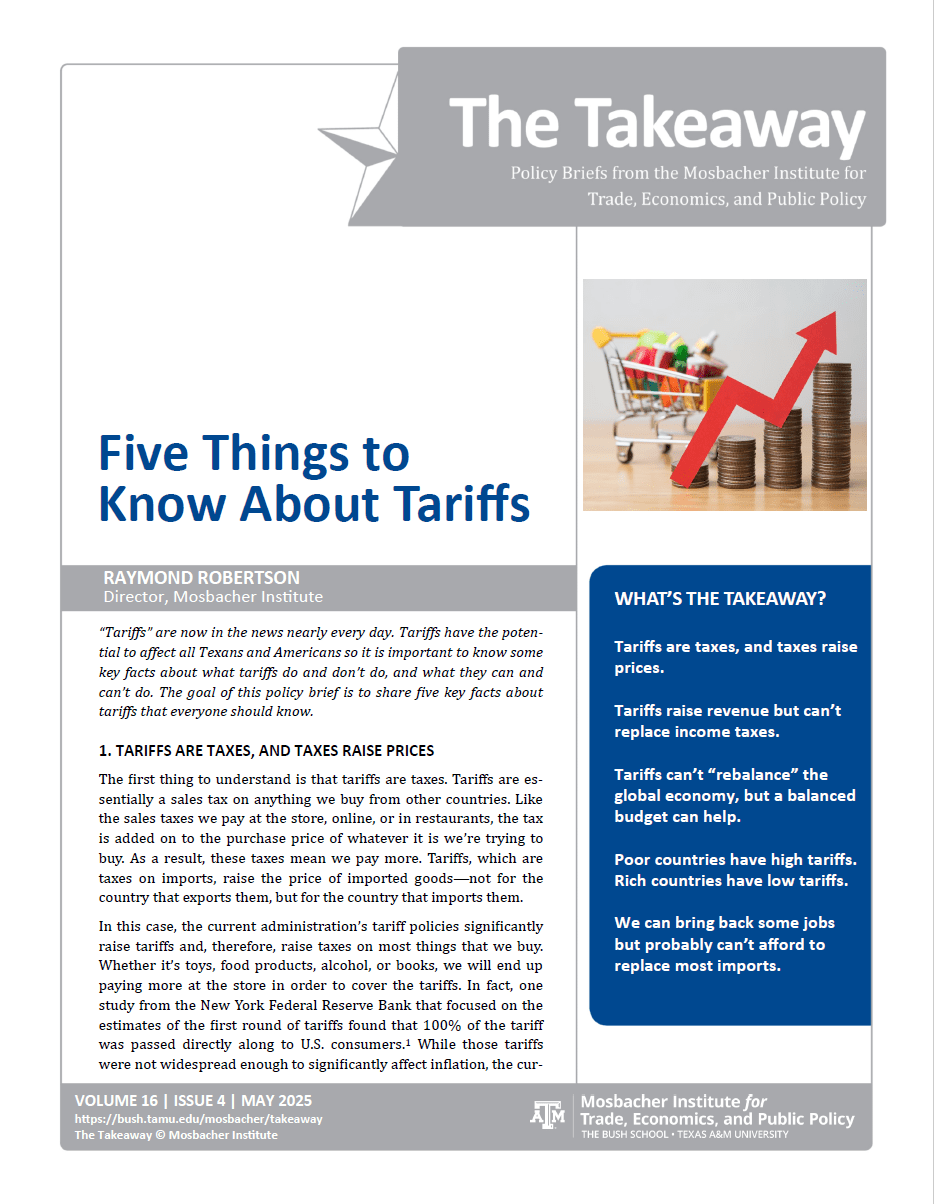
May 2025: Five Things to Know about Tariffs
By Raymond Robertson
Tariffs” are now in the news nearly every day. Tariffs have the potential to affect all Texans and Americans so it is important to know some key facts about what tariffs do and don’t do, and what they can and can’t do. The goal of this policy brief is to share five key facts about tariffs that everyone should know.
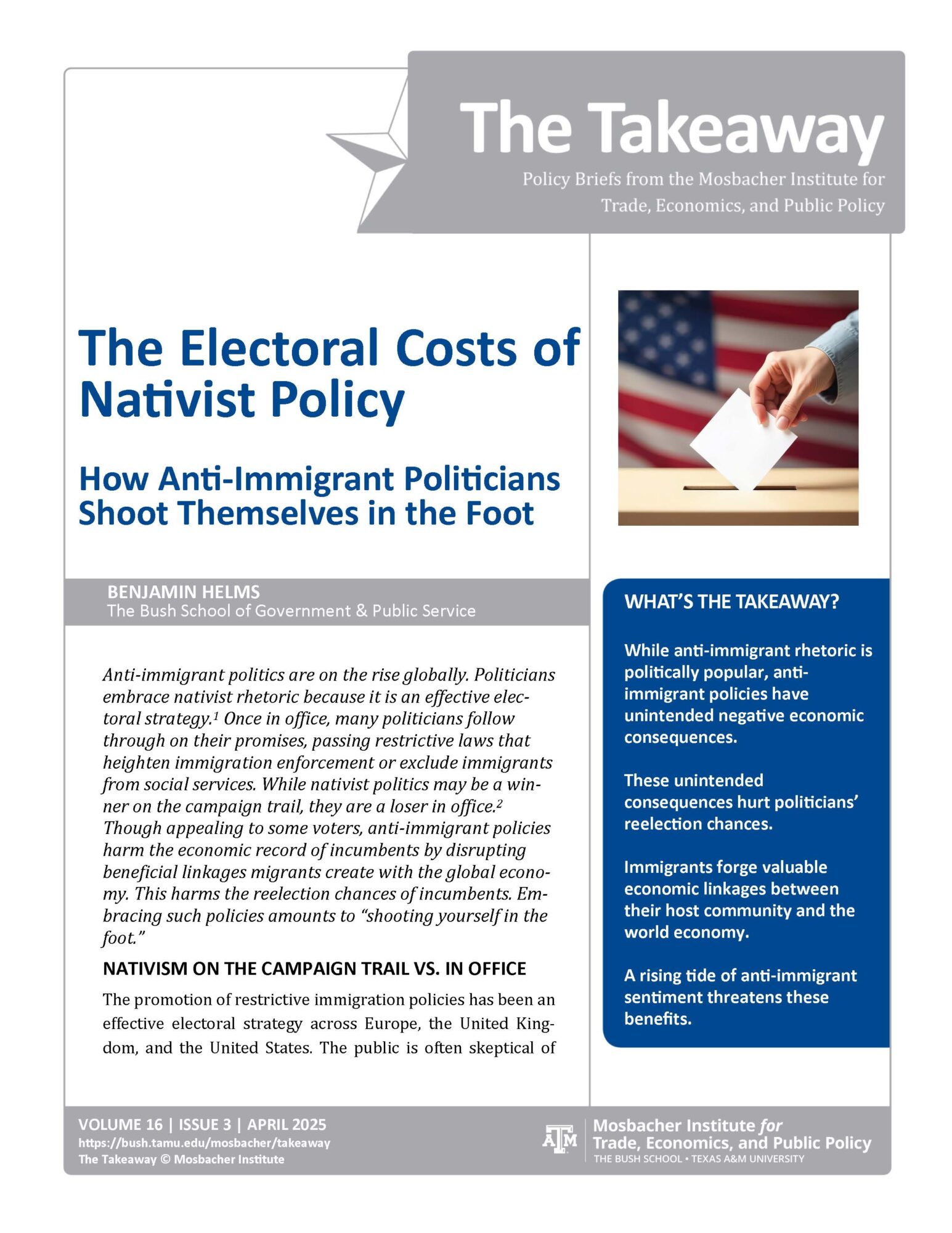
April 2025: The Electoral Costs of Nativist Policy
By Benjamin Helms
Anti-immigrant politics are on the rise globally. Politicians embrace nativist rhetoric because it is an effective electoral strategy. Once in office, many politicians follow through on their promises, passing restrictive laws that heighten immigration enforcement or exclude immigrants from social services. While nativist politics may be a winner on the campaign trail, they are a loser in office. Though appealing to some voters, anti-immigrant policies harm the economic record of incumbents by disrupting beneficial linkages migrants create with the global economy. This harms the reelection chances of incumbents. Embracing such policies amounts to “shooting yourself in the foot.”
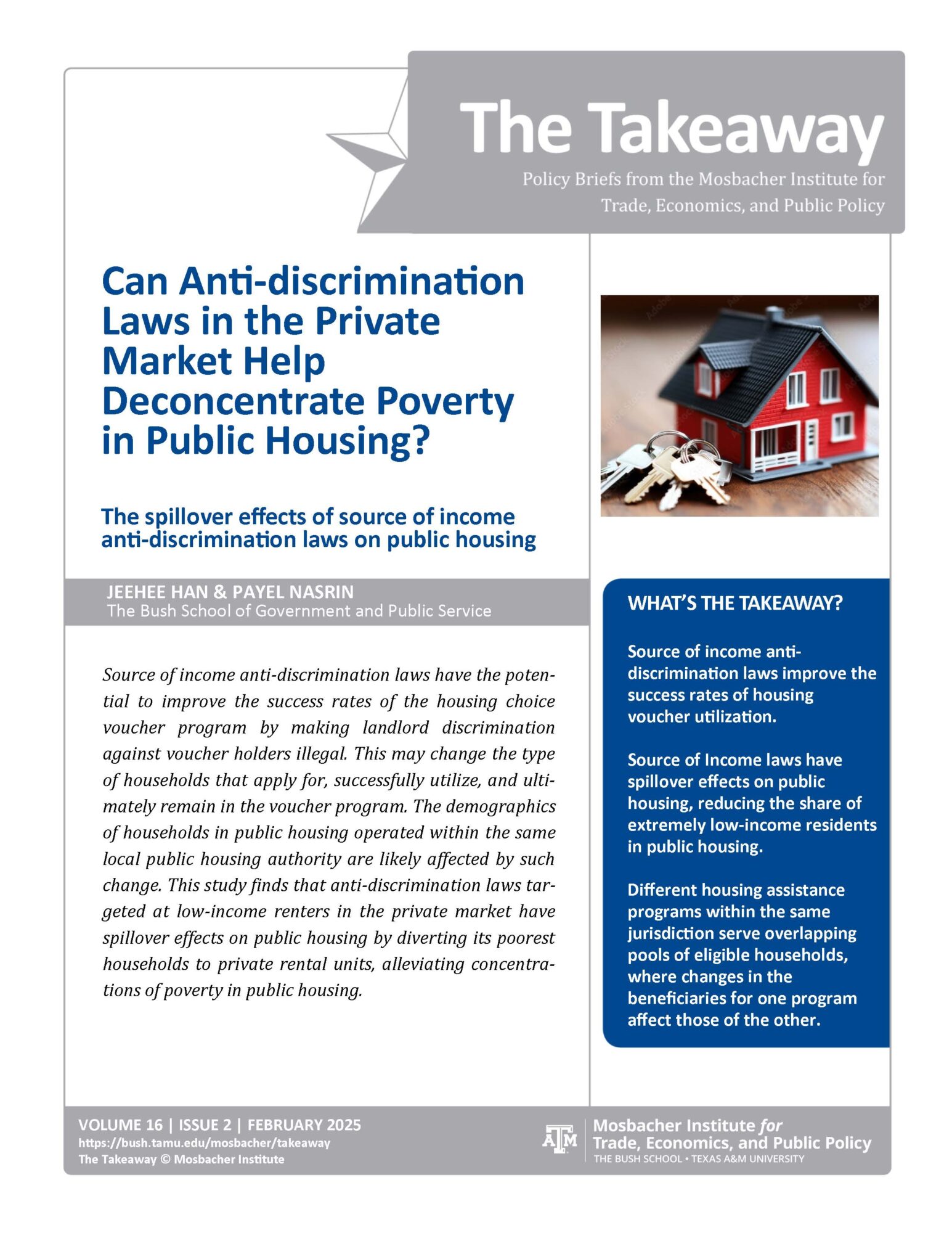
February 2025: Can Anti-discrimination Laws in the Private Market Help Deconcentrate Poverty in Public Housing?
By Jeehee Han and Payel Nasrin
Source of income anti-discrimination laws have the potential to improve the success rates of the housing choice voucher program by making landlord discrimination against voucher holders illegal. This may change the type of households that apply for, successfully utilize, and ultimately remain in the voucher program. The demographics of households in public housing operated within the same local public housing authority are likely affected by such change. This study finds that anti-discrimination laws targeted at low-income renters in the private market have spillover effects on public housing by diverting its poorest households to private rental units, alleviating concentrations of poverty in public housing.
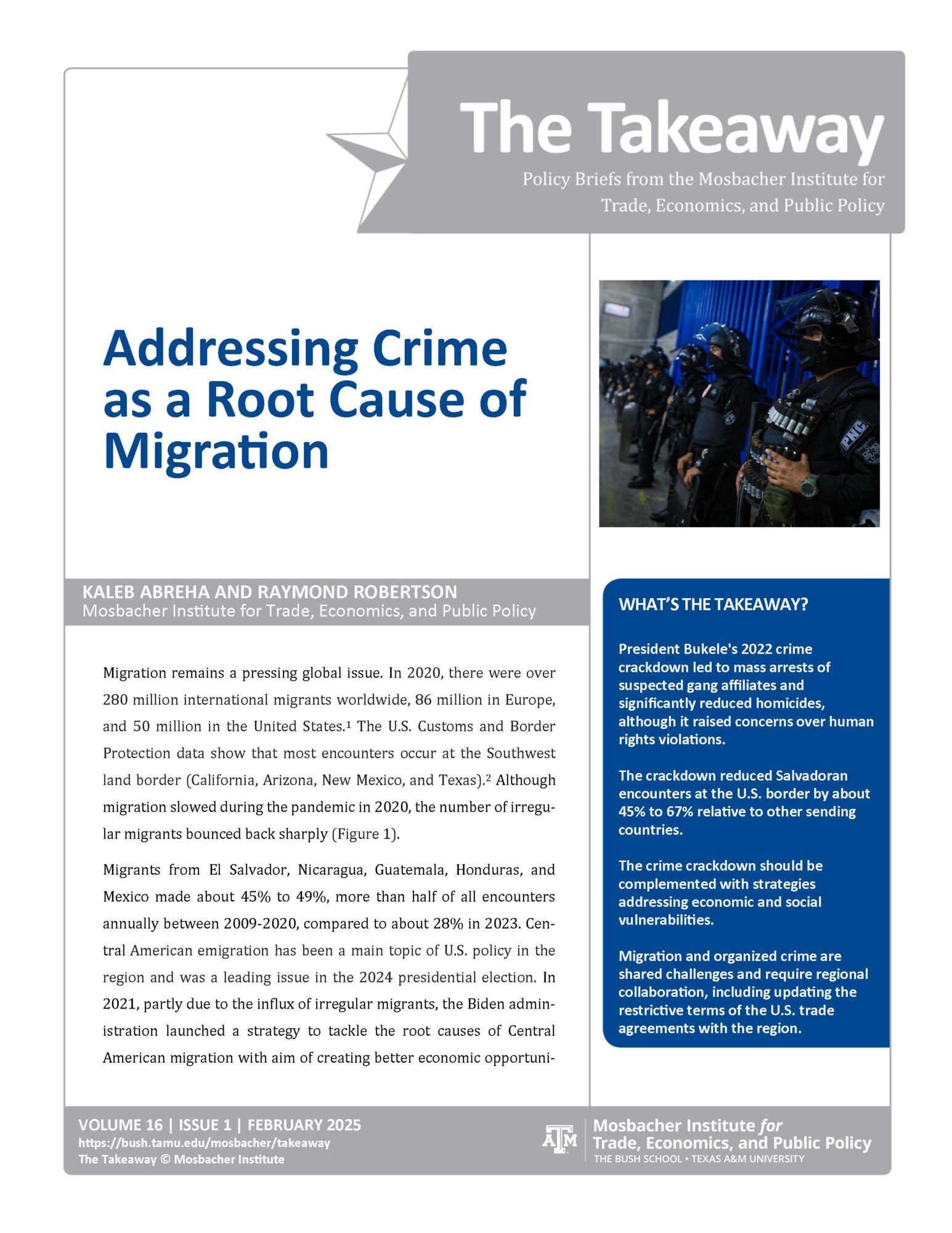
February 2025: Addressing Crime as a Root Cause of Migration
By Kaleb Abreha and Raymond Robertson
Migration is a global challenge driven by push factors in the source countries, pull factors in the destination countries, and migration costs. Among the primary push factors, crime and violence are commonly seen as the root causes, forcing individuals to embark on risky and costly journeys in search of safety and often better economic opportunities. In a recently published paper, the authors examine El Salvador’s 2022 crime crackdown, which resulted in a sharp decline in homicides but raised concerns over human rights violations. They find a significant reduction in Salvadoran encounters at the U.S. border—by approximately 45% to 67% compared to other sending countries. Their findings highlight that addressing the root causes of Central American emigration requires economic and social reforms, along with regional cooperation to combat organized crime, address major human rights issues, and create better jobs for would-be migrants.
Read The Takeaway, Addressing Crime as a Root Cause of Migration
No. 7 The Impact of Public Housing on Children’s Academic Outcomes
Jeehee Han & Amy Ellen Schwartz
No. 6 The Restraining Effects of Foreign Direct Investment on Armed Conflict: How Foreign-Owned Mines Shape the Conflict Location
Gyu Sang Shim
No. 5 Crypto Commerce Comes to Texas: Making Texas Commercial Law More Competitive in the Digital Asset Economy
Christopher Odinet
No. 4 A Journey to Healing: Women’s Empowerment After Mass Killings
Tatiana Zarate-Barrera
No. 3 The Effect of Gas Tax Holidays on Inflation Expectations and Consumption
Yoon Joo Jo
No. 2 The Accessibility of Space
Keilly O’Reilly
No. 1 International Migration and Interstate Conflict
Benjamin Helms
No. 10 ESG and Green Bonds in Public Finance
Noel Nelson and Robert A. Greer
No. 9 The Rise of Organized Retail Crime in America: Risks Resemble those Seen in Conflict Areas
Andres F. Jola-Sanchez
No. 8 Improving Future Wildlife Conservation Programs by Understanding Emerging Stakeholder Values
Hailey Feik, Sydney Fox, Garion Frankel, Erin Kavanagh, Sangeen Khan, Alman Manzoor, Troy Medeiros, Yvette Mensah, Jaylin Morales, Hunter Parker, Javier Miguel Segura, and William Willingham with Dr. Cole Blease Graham
No. 7 Harnessing Regional Trade Agreements as Development Policy Instruments
Kaleb Abreha and Raymond Robertson
No. 6 Empowering Women and Combating Harassment: The Women Powerline Initiative in Uttar Pradesh, India
Anupam Agrawal
No. 5 Leadership of Local Economic Engines: Women in Texas Chambers of Commerce
Rebecca Nelson
No. 4 Manufacturing Productivity Growth and Job Creation in Sub-Saharan Africa
Kaleb Abreha
No. 3 Police Officers as Service Providers and Agents of Change: The Impact of an Ethics Training Program in Ghana
Danila Serra
No. 2 Marketplace Health Insurance & the Public Health Emergency: Implications for Texas
Benjamin Ukert & Laura Dague
No. 1 Leveraging Private Sector Capabilities for Sustainable Economic Development
Kurt Sernett
No. 6 Medicaid & the Public Health Emergency: Implications for Texas
Laura Dague and Benjamin Ukert
- Tomlinson: GOP leaders demand spending cuts, but plans would slash Medicare and Medicaid, Houston Chronicle
- Some enrollees for Texas Medicaid health insurance will be ineligible for coverage under new rules, Houston Public Media
- New report: 700,000 Texans – mostly children – could lose Medicaid health insurance as federal pandemic public health emergency rule ends, Episcopal Health Foundation
- What Happens to Texans’ Insurance Coverage When Medicaid and Marketplace Pandemic-Era Policies End?, The full Episcopal Health Foundation report
No. 5 Democracy on the Battlefield? Why Armed Groups Hold Elections
Reyko Huang
No. 4 Data-Driven Next-Gen Resilient and Sustainable U.S. Supply Chains: At the Front Lines of the Geopolitical New Normal
Lefteris Iakovou
No. 3 Productivity and “War Vulnerability”
Andres Jola-Sanchez
No. 2 When Is Government Spending More Effective in Stimulating the Economy?
Yoon J. Jo
No. 1 Does Price Volatility Information Affect Consumer Choice?
Anastasia Shcherbakova
No. 8 Broken Link: Egypt’s Trade Policy and Local Labor Market Outcomes
Raymond Robertson
No. 7 Local Government Control: The Case of Municipal Incorporation in The Woodlands Township, Texas
Robert Greer, Ann Bowman, Brian Nakamura, and Crayton Brubaker
No. 6 The Elitism of Armed Rebellion
Reyko Huang
No. 5 Warfare is a “Train Wreck” for Global Supply Chains
Andres Jola-Sanchez
No. 4 Lobbying in Good Times and in Bad
Anastasia Shcherbakova and Helen Wakefield
No. 3 The Senior Healthcare Divide in Texas
Sallie Sherman
- Health care for seniors in rural Texas is in jeopardy, The Dallas Morning News
No. 2 Public-Private Partnerships in the Water Sector
Robert A. Greer and Lindsey Pressler
- Full research article: Public–Private Partnerships in the Water Sector: The Case of Desalination
No. 1 Female Role Model Impact on the Gender Attitudes of Children: Evidence from Elementary Schools in Somalia
Danila Serra
No. 14 Improving Working Conditions in Global Value Chains
Raymond Robertson and Benjamin Zimmer
No. 13 How U.S. Patchwork Land Ownership and Regulation Affects Oil and Gas Drilling
Eric Lewis
No. 12 Medicaid Expansion’s Impact in Texas
Laura Dague and Constance Hughes
- As COVID-19 leaves Texans jobless and lacking health insurance, lawmakers mull expanding Medicaid, The Dallas Morning News
- County-level projections of Medicaid expansion’s impact in Texas, The full Episcopal Health Foundation report
- About A Million Texans Could Gain Health Insurance This Year If Texas Expands Medicaid, Study Finds, KUT Austin
- Medicaid expansion could bring Texas $5.4 billion in federal dollars, study says, The Houston Chronicle
- Medicaid expansion could bring Texas $5.4 billion in federal dollars, study says, Midland Reporter-Telegram
- Medicaid Expansion Could Mean $5.4B in Federal Funds for TX, Health Payer Intelligence
- Bush School study estimates impact of Medicaid expansion in Texas, State of Reform
No. 11 Call of the Pandemic: Rethinking Global Value Chains
Anupam Agrawal
No. 10 Identity, Resilience, and Risk in the Informal Sector: Differential Effects of COVID-19 in Lagos, Nigeria
Jessica Gottlieb
- How the coronavirus pandemic is fueling ethnic hatred, The Washington Post
No. 9 Artificial Intelligence: A Double-edged Sword
Justin Bullock
No. 8 Achieving the DREAM: The Effect of IRCA on Immigrant Youth Post-Secondary Educational Access
Tyler Tidwell
No. 7 Sustainable Funding Options for Texas Wildlife Conservation
Student Capstone Project
No. 6 COVID-19 No Match for the Forces of Global Trade
Richard Metters
No. 5 Shell Games: Chinese Reverse Merger Fraud
Benjamin Zimmer, Joseph Balmain Rodgers, and Brian Tripsa
No. 4 Humanitarian Response to COVID-19
Andres F. Jola-Sanchez
No. 3 Lobbying Battles in the Libyan War
Reyko Huang
No. 2 Property Buyouts After Natural Disasters: The Economic Implications for Texas Residents
Michael Migaud
No. 1 California’s Solar Rooftop Experience: An Update
James M. Griffin
No. 8 How US Imports from China Affect Mexican Labor Markets
Raymond Robertson
No. 7 Financial Implications of Coal-to-Gas Fuel Switching
Anastasia Shcherbakova
No. 6 Voter Turnout in Texas: Can It Be Higher?
James McKenzie
No. 5 Humanitarian Crisis on the Southwest Border
Madison L. Moore
No. 4 The Permian Basin: A Tribute to American Innovation and Entrepreneurship
James M. Griffin and Robert Joseph Ladmirault Jr
No. 3 Governing the Water-Energy-Food Nexus: What it Is and Why it Matters
Kent E. Portney
No. 2 Two More Reasons Why the Federal Debt Matters
Raymond Robertson
No. 1 California’s Solar Rooftop Experience: A Report Card
James M. Griffin and Robert Joseph Ladmirault Jr.
No. 5 Why We Need the USMCA (the agreement formerly known as NAFTA)
Raymond Robertson
No. 4 Nonprofit Donor Motivation Under the Tax Cuts and Jobs Act
Kenneth Anderson Taylor
- How Houston nonprofits are affected by the new tax cuts and jobs act, Houston Business Journal
No. 3 Not Enough Progress: Texas Still Leading in Health Uninsurance Rates
Ashley Thomas
No. 2 Texas Groundwater: Dispelling Some Common Misconceptions
James M. Griffin
- Interjecting economics into the groundwater policy dialogue, Texas Water Journal (2017)
No. 1 Understanding China’s Currency Manipulation
Rebecca Skaff, Lincoln Webb, and Kyle Clahane
No. 3 Are There Benefits to a Higher Standard?: The Effects of Raising the Standard Tax Deduction
Lori L. Taylor
No. 2 IT Can Be Done: Reducing Payment Errors in Unemployment Insurance
Justin Bullock and Robert Greer
No. 1 A Smart, Price-Based Energy Policy
James M. Griffin
No. 3 The NAFTA Intellect Disconnect: Actual Costs and Benefits versus Popular Perceptions
Raymond Robertson
No. 2 Phantom Capital: How Regulation Weakens Texas Groundwater Resources
Wayne R. Beckermann and Mason Riley Parish
No. 1 Giving an “F” to the Franchise Tax: The Texas Franchise Tax Fails to Fund
Lori L. Taylor, Erica Cottingham, and Allison Shea
- January 11, 2017: Leffingwell: It’s time to repeal the state Franchise Tax, Austin American-Statesman
No. 7 Striking a Workable Balance: Labor Provisions in the Trans-Pacific Partnership
Raymond Robertson
No. 6 Environmental Regulation
Manuel P. Teodoro and David M. Konisky
No. 5 The Hidden Tax of Jury Service
Lori L. Taylor
No. 4 When Equal is Not Equitable: Adjusting for Geographic Differences in Education Costs
Lori L. Taylor
No. 3 Fairer Trade: Removing Gender Bias in US Import Taxes
Lori L. Taylor and Jawad Dar
- March 8, 2016: A look behind the gap, The Battalion
- March 8, 2016: Texas A&M prof on pink tax: Tariffs can be six times higher for women’s clothes, The Dallas Morning News
- March 9, 2016: Study: Women’s apparel tariffs as much as 6x higher than men’s, The Eagle
- March 14: 2016: Why are women paying the ‘Pink Tax’ on clothing?, Texas Standard
- March 23, 2016: Why Fashion’s ‘Pink Tax’ Means Women Pay More, Business of Fashion in London
No. 2 Bumpy Road Ahead: Bracing for Insolvency in the Highway Trust Fund
Jawad Dar and Lori L. Taylor
No. 1 Reaching More for Less: Modernizing US International Food Aid Programs
Andrew Natsios
No. 7 Water Use for Hydraulic Fracturing: A Texas Sized Problem?
David LeClere
No. 6 The War on Poverty Needs a New Map
Lori L. Taylor and Jawad Dar
No. 5 Free Trade in Oil and Natural Gas
James M. Griffin and F. Gregory Gause, III
No. 4 Texas Cities in the Era of Government Transparency
Domonic A. Bearfield and Ann O’M. Bowman
No. 3 Avoiding the Mistakes of the Past: Rejecting Protectionism and Embracing the Global Economy
Kishore Gawande and David LeClere
No. 2 Preschool for All?: Simple Keys to Maximizing Return on Investment and Avoiding Unintended Consequences
Lori L. Taylor
- Op-Ed in Longview, Texas’ News-Journal – September 20, 2014
Lori L. Taylor - Op-Ed in TribTalk, a publication of The Texas Tribune – October 5, 2014
Lori L. Taylor
No. 1 A Time for Political Courage: The Federal Debt Crisis in 2014
Lori L. Taylor and James M. Griffin
No. 1 The Latest Unanticipated Consequence in the Ethanol Fiasco
James M. Griffin
- Scholarly article in The Energy Journal, “U.S. Ethanol Policy: Time to Reconsider?” https://dx.doi.org/10.5547/01956574.34.4
- American Energy Alliance’s “Bright Bulb” Award – January 24, 2014
No. 2 Ethanol Waivers: Needed or Irrelevant
James M. Griffin and Rachael Dahl
- Op-ed in the Houston Chronicle – November 16, 2012
James M. Griffin and Rachael Dahl - Op-ed in the Dallas Morning News – December 2, 2012
James M. Griffin and Rachael Dahl
No. 1 U.S. Ethanol Policy: The Unintended Consequences
James M. Griffin and Mauricio Cifuentes-Soto
No. 2 Deficit Reduction: $38 Billion Won’t Cut It
James M. Griffin and Lori L. Taylor
No. 1 Stop Playing Favorites with the Tax Code
Lori L. Taylor
- Op-Ed in the Houston Chronicle – Jan. 30, 2011
Lori Taylor - Op-Ed in the Dallas Morning News – Feb. 4, 2011
Lori Taylor
No. 2 The Time for A Carbon Tax Is Now
James M. Griffin and Kishore Gawande
- Op-ed in the Houston Chronicle – Sept. 18, 2010
James M. Griffin and Kishore Gawande - Op-ed in the Houston Chronicle – June 12, 2010
James M. Griffin
No. 1 The Oil Debacle in the Gulf of Mexico:
An Alternative to the Coming Flood of Offshore Regulations
James M. Griffin

